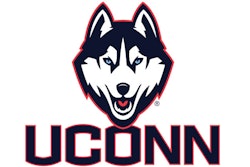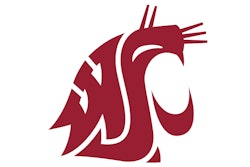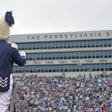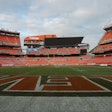Copyright 2016 Digital First Media
All Rights Reserved
The Daily News of Los Angeles
Tony Parker beamed from behind the thick bulletproof window separating him from customers at his Forum liquor store on Prairie Avenue in Inglewood.
Asked about construction across the street on the new NFL stadium that will be home to the Los Angeles Rams, Parker didn't mince words: "I like it. The future is bright."
City officials and civic leaders hope Parker is right. But beyond the money that will roll in from taxes generated by the new NFL palace when it opens in 2019 and the massive adjacent development, it's still unclear what it all means for Inglewood itself.
The self-proclaimed "City of Champions" was devastated when the Los Angeles Lakers and Kings abandoned the Fabulous Forum in 1999 and a megachurch bought the aging arena, ultimately leaving it mostly unused. Then the once-heralded Hollywood Park Racetrack closed in 2013 amid sagging attendance, a metaphor for a community that seemed to have lost its luster.
But Madison Square Garden Co. bought the Forum and transformed it two years ago into the top concert venue in California. And the Hollywood Park Casino has built a new facility to attract high-end gamblers to town.
But those are minor rebounds in a community that needed more. Enter Stan Kroenke and his St. Louis Rams. The man who made his fortune in real estate brought his Rams back to Los Angeles with a fat wallet and a stunning vision for the land that Hollywood Park Racetrack occupied until it was razed.
Kroenke and big-shot National Football League officials - including Commissioner Roger Goodell - visited the neighborhood Thursday for a groundbreaking ceremony, even though above-ground building on the stadium hasn't yet begun. On Saturday, officials said that either the San Diego Chargers or Oakland Raiders also will make their home at the new stadium and that a team decision is "imminent."
The $2.6 billion stadium will be largely underground to meet Federal Aviation Administration height requirements that limit it to 175 feet tall. The FAA hasn't yet approved design plans because of safety concerns about the stadium's proximity to heavily trafficked air space directly above it. And cranes aren't allowed on the site until the FAA blesses the plans.
But developers and league officials haven't been swayed by the hiccup.
"We are confident this is going to be the place to be in 2019 and beyond," Goodell told throngs of media and local leaders at the groundbreaking.
Added Kroenke: "People all over the world will seek this destination out."
But will it transform Inglewood? Or simply be an island of glitz in a sea of yawning need?
Certainly, the huge development will bring jobs to an overwhelmingly black and Latino city of roughly 118,000 that is plagued with an unemployment rate bumping up against 10 percent, sagging public schools and high crime. And the surge of new revenues should help heal the $9 million annual structural operating deficit that has hampered the city budget for many years over the past decade.
Mayor James Butts anticipates an $18 million shot-in-the-arm to the 2019-20 budget because of the stadium and its ancillary developments. In the following decades, he expects that number to more than double.
Butts has been the thread between these lucrative deals since winning his bid for mayor in 2011 after a career launched at the Inglewood Police Department, where he rose to the rank of deputy chief and went on to lead the Santa Monica Police Department.
His deep knowledge of those two cities, he said, "formed my belief that entertainment, sports and high-end retail were required to become and maintain a vibrant economy to transcend the boom/bust cycles of an ever-fluctuating national economy."
"In other words," he said in an email, Inglewood needs "people and cars from other jurisdictions" to come and shop regularly.
Butts said he and Kroenke drafted the core vision for the Hollywood Park stadium and massive mixed-use development in their initial 2 1/2-hour meeting in his City Hall office in November 2014. Envisioned are at least one hotel, movie theaters, shops, restaurants, housing and parks.
The tidal wave of development momentum generated by such a mammoth project will spread out to the rest of the city, finally bringing modern upgrades to the old business district along Market Street, Butts believes. Specifically, he envisions mixed-use commercial development interspersed with homes there.
Los Angeles developers Thomas Saffron and Associates, who have been opening one luxury condominium and affordable-housing development after another in Carson since the recession, have invested in Market Street's potential already. The firm is erecting a six-story building with 177 apartments near the site of the future Metro station set to open in conjunction with the stadium.
"Market Street will be somewhat reminiscent of Old Town Pasadena," Butts said. "Inglewood, by necessity, will become the incubator for last-mile systems to bring sports and entertainment customers from the Metro stations - named Champions Station and Fairview Heights - to the entertainment district encompassing the Forum, the Rams stadium as well as the retail and dining adjacent."
Meanwhile, the technology and aviation industries are increasingly looking to Inglewood for warehouse space and business offices, he said. The region is experiencing a boom in new-age aerospace and digital-technology companies.
Is a stadium enough?
Alone, an NFL stadium cannot help turn a city around. It may deliver prestige, but the adjacent businesses will bring the real money to town, economists say.
"The football team and the stadium itself won't have a major impact," said Andrew Zimbalist, an economics professor at Smith College with expertise in the business of sports. "They only play 10 games a year, and you're talking about taking up an immense amount of land. You're using up 30 to 50 acres of land for an activity that doesn't take place 345 days a year."
The roughly 300-acre L.A. Stadium and Entertainment District at Hollywood Park is three times the size of Century City, and more than three times that of Disneyland, according to city officials and developers.
Roger Noll, economics professor emeritus at Stanford University, said developments of this size usually fill out over a 10-year period.
"(Kroenke's) plan to build residential and commercial space seems quite plausible to me, and that would be transformative to Inglewood," Noll said. "He not only has to start building it, but Phase One has to be successful. Not only people living in Inglewood, but people in the greater Los Angeles region have to start coming there in a regular way. It's got to become a centerpiece. Whether that's plausible or not is anyone's guess."
Butts, lauded citywide for his tireless promotion of the community and this deal, has staked his political legacy on bringing Inglewood's glory days back. And he points to the rehabilitation of the Forum as the starting point to the city's renaissance.
Forum reopening 'is the beginning'
The indoor arena, decorated with 72 Roman-inspired white columns, reopened with a bang in 2014. Now, the arena - directly across from the stadium lot - is the state's most popular concert-going destination.
The city already is reaping dividends from its success, with more than $1.5 million added to its coffers in the 2014-15 fiscal year, Butts said.
"The 7-Eleven stores are doing booming business with the Forum," he said. "The Renaissance homeowners adjacent to the site are thrilled. Everyone has had to adjust to the Forum traffic. But overall people in town are proud and thrilled."
Willie Agee, a 53-year resident, Korean War veteran and parks and recreation commissioner, agrees with the mayor's assessment.
"The Forum is the beginning," he said. "I've seen the city go down to rock bottom. In the last 4 1/2 years, I've seen it go back to the top. It's really shining."
Like Parker and Butts, Agee has nothing but high hopes for the stadium and its ability to bring residents of greater Los Angeles and beyond to a city long projected as a bastion of crime and poverty. The quintessential example of Inglewood's tarnished image came in the 1991 film "Grand Canyon," where a horrified main character finds himself lost in a bad part of town surrounded by gangbangers. Inglewood officials protested the representation but the image persisted.
In October, the city's fortunes took another positive turn with the opening of the newly built Hollywood Park Casino. The modern facility boasts 125 card tables under gold and glass chandeliers, a premium simulcast off-track wagering room, a sports bar and a lounge.
Butts believes the casino will deliver $2 million a year to the city's struggling general fund budget. That's a conservative figure, considering that Gardena's two similarly sized card clubs pay that city nearly $10 million annually.
Gentrification worries
Local business owners differ on the long-term effects of the coming transformation. Many, like Bourbon Street Fish owner Derrick Brown, plan to renovate to keep up with the surrounding upgrades. They believe their customer base will only grow from the coming changes.
"We already have a slight increase in business from the truck drivers and construction workers," Brown said. "We're looking to remodel and renovate this whole corner (at Prairie Avenue and Kelso Street). The rents have risen a lot. I see people moving in and out constantly because people can't afford the rent. That's one thing that's not good."
Michael Park, owner of Candy's hair, nail and beauty shop on Century Boulevard, said the street repairs underway decimated his business.
"Construction is killing us because they narrowed (Century Boulevard) to one lane," Park said. "For the future, yeah, it will be a good thing. I'm just hoping they do it quickly. But I don't know how the city will handle the (stadium) traffic. On game days, it will be rough."
Park's independent business sits inside a new shopping strip dominated by national tenants like Target and Panda Express. Across the street, a new Costco, Red Lobster and In-n-Out Burger have an out-of-place clean sterility that doesn't bode well for the Church's Chicken and low-budget motels nearby.
The strip, Butts said, is a hot commodity now for larger national tenants.
"Century Boulevard between Prairie and La Cienega is the focus of fierce investment activity and should become a hotel and retail district proving synergy with the sports entertainment district," Butts said. "The same activity is taking place on Prairie Avenue between Century and the 105 Freeway."
Whether Candy's hair, nail and beauty shop will survive the transformation is unclear, but Park is planning upgrades.
For some residents and business owners, the city's sudden popularity with outsiders stokes fears that the community will lose its character to the steady influx of newcomers.
Already, property values are soaring in the vicinity of the future stadium. Aside from the few new shopping centers and housing developments, the neighborhood mostly is home to a collection of older-era, run-down liquor stores, eateries, laundromats and beauty shops that cater to locals.
Dominique DiPrima, host of Inglewood radio station KJLH 102.3 FM's morning talk show "The Front Page," said she's excited about the stadium but wants local residents and business owners to have a bigger voice in the development.
She's urging local listeners not to sell their homes and leave town because of the sudden increase in property values, saying they should stay rather than "automatically assuming all this is not for us."
"Wherever possible, low-income African-American and Latino people, don't sell. Stay put," DiPrima said. "It's important to hold lawmakers accountable to at least keep some of the city's character."
She wants to see local businesses become part of the project rather than only relying on national retailers found in any other city or suburb.
"I think people want football. That alone is instant cache and imaging for a city in need of cache and imaging," DiPrima said. "We're at a crossroads. We see Inglewood having that radical transformation.
"So now as a community we have to be able to be at the table and not just be bulldozed, but actually be a partner and a voice in this. I think that if people get a sense of what's possible, that can happen."
Read More of Today's AB Headlines
Subscribe to Our Daily E-Newsletter
Terms and Conditions Privacy Policy



































